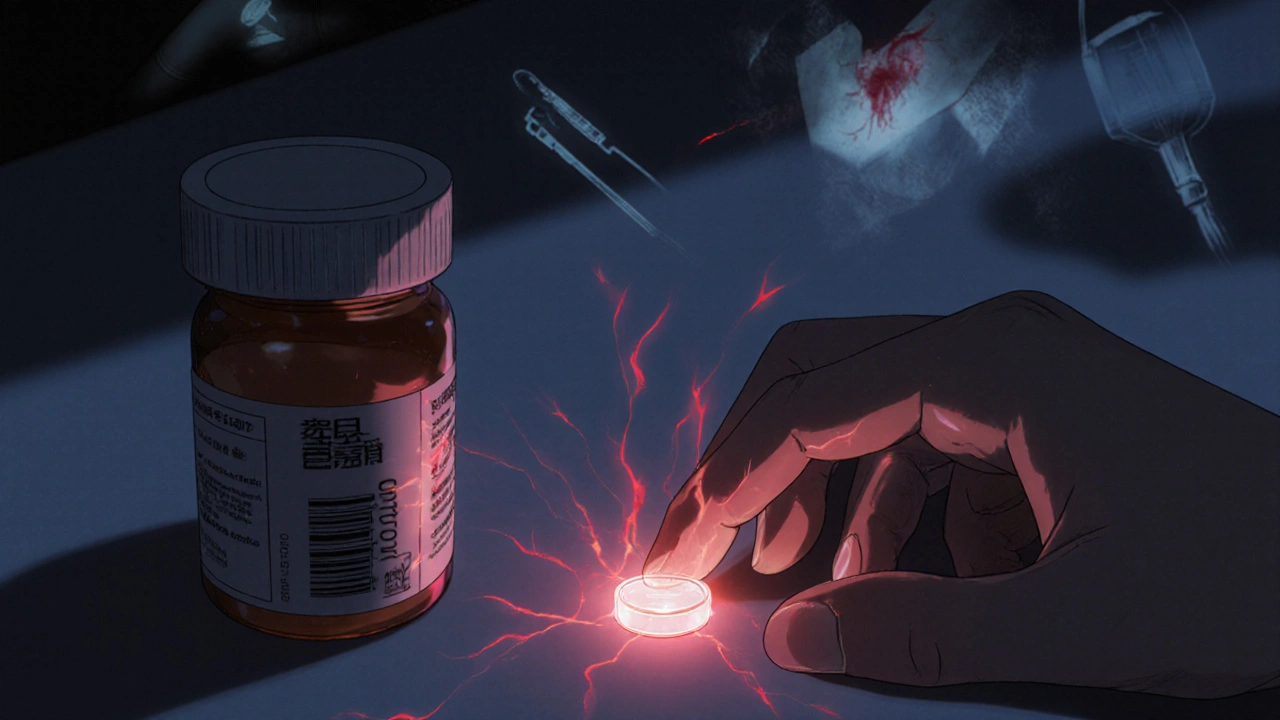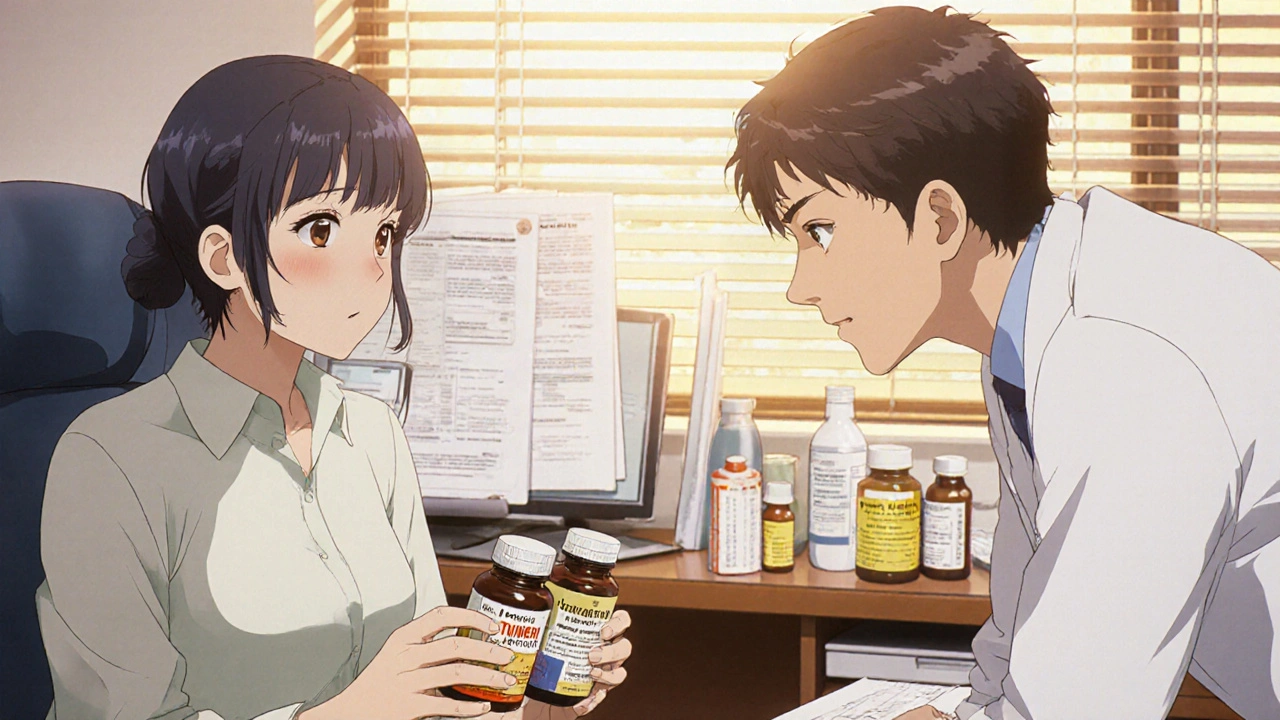It’s not uncommon to pop a daily vitamin, grab a turmeric capsule for joint pain, or sip chamomile tea to help you sleep. You might even think these are harmless-after all, they’re "natural." But here’s the hard truth: supplements and herbal remedies can be just as powerful-and just as dangerous-as prescription drugs. And if your doctor doesn’t know you’re taking them, you’re putting yourself at risk.
Most People Don’t Tell Their Doctors-But They Should
A 2018 study found that only 13% of people told their primary care doctor about the supplements they were using. Even among people with chronic conditions like high blood pressure, diabetes, or heart disease-those most at risk for dangerous interactions-the rate barely crept above 50%. That’s not a small oversight. That’s a public health blind spot. Why? Many assume their doctor won’t care. Others think, "It’s just a pill from the store. It’s not medicine." But St. John’s wort, garlic, ginkgo, and even common vitamin D can interfere with blood thinners, antidepressants, birth control, and chemotherapy drugs. In fact, St. John’s wort can cut the effectiveness of oral contraceptives by up to 50%, leading to unplanned pregnancies. Turmeric can thin your blood so much that you bleed during minor surgery. And if you’re on statins, grapefruit juice or red yeast rice could trigger dangerous muscle damage.Doctors Aren’t Always Asking-But They Should Be
The problem isn’t just patients hiding their habits. It’s that doctors often don’t ask. A 2021 survey showed only 27% of physicians felt confident in their knowledge of herbal supplements. Many assume patients will volunteer the information. But most won’t-unless prompted. Research from the Journal of Family Medicine and Disease Prevention found that when doctors asked direct questions like, "Are you taking any vitamins, herbs, or supplements?"-not just "Do you take any supplements?"-disclosure rates jumped from 33% to 78%. The wording matters. "Any vitamins?" gets a yes. "Are you taking anything from the health store, the pharmacy shelf, or your neighbor’s recommendation?" gets the truth.What You’re Not Telling Them Could Be Killing You
Let’s be blunt. The FDA doesn’t approve supplements before they hit the shelves. They’re regulated like food, not drugs. That means a product labeled "100% natural" could contain hidden prescription ingredients, heavy metals, or contaminants. A 2023 FDA alert flagged over 170 ingredients with documented safety risks-many still sold openly. One Reddit user shared how he took garlic pills for "heart health" for years. He never mentioned it to his doctor. When he needed a minor procedure, he started bleeding uncontrollably. His surgeon found out only after his blood wouldn’t clot. The garlic had thinned his blood-no one knew. Another woman took ashwagandha for stress. She didn’t think it mattered. But it raised her thyroid hormone levels so high she ended up in the ER with a racing heart. Her endocrinologist said, "If you’d told me, we could’ve adjusted your medication before this happened."How to Talk to Your Provider-Without Feeling Judged
You might worry your doctor will roll their eyes or tell you to stop. But here’s what actually happens when people do speak up: 78% say their provider gave them useful advice. 63% felt more trusted afterward. You don’t need to defend your choices. Just state them plainly:- "I take ashwagandha every morning for anxiety."
- "I’ve been using fish oil for my joints since last year."
- "My cousin swears by this turmeric blend. I’ve been taking it for three months."

What Your Provider Can Do Once They Know
Once you disclose, your doctor can:- Check for dangerous interactions with your current meds
- Adjust your prescriptions to compensate for supplement effects
- Suggest safer alternatives
- Monitor your blood work for signs of toxicity or imbalance
- Help you find high-quality brands (yes, some are better than others)
It’s Not Just About Safety-It’s About Trust
When you hide what you’re taking, you’re not protecting yourself. You’re building a wall between you and your care team. The goal isn’t to judge your choices-it’s to keep you alive. Think of it this way: if you were taking a new prescription, you’d tell your doctor. You’d ask about side effects. You’d mention other meds. Supplements should be no different. They affect your body the same way. They just don’t come with a warning label that says, "May cause liver damage or interact with blood pressure meds."What to Do Next
Here’s your simple, no-excuses action plan:- Look in your medicine cabinet. Write down every supplement, herb, tea, or powder you take daily or weekly-even if you only take it "sometimes."
- Bring the bottles to your next appointment. Don’t rely on memory.
- Ask: "Could any of these interact with my other meds?"
- If your doctor brushes you off, find one who listens. Your health isn’t optional.

What’s Changing-And Why It Matters
The medical world is waking up. The American Medical Association now requires medical schools to teach supplement interactions. The FDA is adding more dangerous ingredients to its warning list. Apps like MyMedList help patients track what they take and share it with providers. By 2026, electronic health records will likely include mandatory fields for supplement use. But you don’t have to wait for the system to catch up. You can act today.Frequently Asked Questions
Do I need to tell my doctor about vitamins I take every day?
Yes. Even common vitamins like vitamin D, vitamin K, or high-dose B12 can interfere with medications. For example, vitamin K reduces the effectiveness of blood thinners like warfarin. Vitamin D in large doses can raise calcium levels and strain your kidneys. Your doctor needs to know to monitor your levels and adjust your treatment.
What if my doctor says supplements are useless?
It doesn’t matter if they think they’re useless. What matters is whether they’re safe for you. Even if a supplement has no proven benefit, it might still interact with your prescription drugs. Your job isn’t to convince them-it’s to make sure they know what you’re taking so they can keep you safe.
Are herbal remedies safer than prescription drugs?
No. Just because something is "natural" doesn’t mean it’s safe. Herbs like kava, comfrey, and licorice root can damage your liver. Others like ephedra (now banned) have caused strokes and heart attacks. Many herbal products contain unlisted pharmaceuticals. The lack of regulation makes them riskier than many prescription drugs.
I only take supplements on weekends. Do I still need to tell my doctor?
Yes. Your body doesn’t know if you take something daily or just on weekends. Many supplements build up over time. Others, like blood thinners or liver-affecting herbs, can cause harm even with occasional use. Your doctor needs the full picture-even if you think it’s "not a big deal."
What if I’m embarrassed to admit I take supplements?
You’re not alone. Most people feel the same way. But your doctor has heard it all. They’ve seen patients take everything from dragon’s blood resin to CBD gummies for insomnia. Their job isn’t to judge-it’s to protect you. Being honest helps them help you. And the more you do it, the easier it gets.


Comments
Matthew Peters November 20, 2025 AT 03:12
Been taking turmeric for my knees for years. Never thought it was a big deal until my cousin had surgery and they found out her blood was paper-thin from the same stuff. Scared the hell out of me. Now I bring my bottles to every appointment. Worth it.
Nosipho Mbambo November 21, 2025 AT 13:00
So... you're saying if I take ashwagandha for anxiety and my doctor doesn't know... I could end up in the ER?? With a racing heart?? Like, that's not even a joke?? I'm literally holding my bottle right now... I'm gonna screenshot this and send it to my PCP. 😳
Matthew Karrs November 21, 2025 AT 21:41
Of course the FDA doesn't regulate supplements. They're in bed with Big Herbal. Same way they let glyphosate through. You think this is about safety? Nah. It's about control. They want you dependent on their pills. Natural stuff? Too cheap. Too hard to patent. That's why they don't want you talking about it.
Russ Bergeman November 22, 2025 AT 20:20
Wait. So you're telling me my daily fish oil could make me bleed out during a tooth extraction?? That's... that's insane. I take 3 of those a day. I didn't even know they had blood-thinning effects. I'm gonna cancel my cleaning. And maybe my life.
Liam Strachan November 23, 2025 AT 02:46
Hey, I get it. I used to think supplements were just harmless little boosts. But my mum had a bad reaction to a 'natural' sleep aid she got from a wellness influencer. Turned out it had melatonin doses 10x higher than labeled. She ended up in the ER. Now I always ask my doctor. And I bring the bottle. It's not about trust. It's about not dying.
Johannah Lavin November 24, 2025 AT 15:59
I used to feel weird telling my doctor about my CBD gummies. Like I was admitting to something shady. But the other day I just said, 'I take these for stress.' And she smiled and said, 'Oh good, I was going to ask you about those.' I cried a little. Not because I was scared. Because I felt seen. You don't need to be perfect. Just honest.
Ravinder Singh November 25, 2025 AT 11:57
Bro. I’m from India. We’ve been using turmeric, neem, ashwagandha for centuries. But here’s the thing: back home, we know the dosage, the source, the season it was harvested. Here? You buy a bottle with ‘100% natural’ on it and it’s got fillers, heavy metals, and who knows what else. Knowledge is power. Bring the bottle. Ask the question. You’re not weird. You’re smart.
Destiny Annamaria November 25, 2025 AT 20:38
My yoga teacher gave me this 'magic' mushroom blend for 'energy'. Told me it was 'totally legal and safe'. I took it for 3 weeks. Then I started having panic attacks at 3am. Turns out it had a banned stimulant. My doctor was chill. Didn't judge. Just said, 'Next time, bring the bag.' So I did. And now I know what's in my body. Thank you for this post.
Katie Magnus November 27, 2025 AT 09:08
Oh my god I'm so done with this. People think because something's from a plant it's safe? Plants kill people. Poison ivy. Deadly nightshade. Hemlock. And you're telling me a turmeric capsule is less dangerous than a pill from a lab? This is why we're all dying. The system is broken. And now they want us to be their little data points? No thanks.
Gerald Cheruiyot November 27, 2025 AT 17:34
Supplements are just another form of capitalism pretending to be spirituality. You buy a $40 bottle of 'ancient wisdom' because you're scared of modern medicine. But the truth is, you're not afraid of the pill. You're afraid of being told you need to change your life. The supplement industry sells hope. But real healing? That's harder. And it doesn't come in a capsule.
King Over November 28, 2025 AT 21:11
Just took my vitamin D and magnesium today. Never thought to mention it. Guess I'll bring the bottles next time. Simple. No drama. Just facts. That's all that matters.
Dana Oralkhan November 29, 2025 AT 20:42
I used to hide my CBD oil because I thought my doctor would think I was a stoner. Then I got diagnosed with chronic pain. She asked me point blank, 'Are you using anything else?' I told her. She said, 'Good. Now we can adjust your morphine dose.' I didn't know it was interacting. She didn't know I was taking it. We fixed it. No shame. Just science.
Jeremy Samuel November 30, 2025 AT 23:24
supplements r just a scam. all that stuff is just sugar and fillers. if you want to feel better eat real food. sleep. move. stop buying magic powders. your body dont need 17 different pills to work. you just need to stop being lazy.
daniel lopez December 1, 2025 AT 17:43
They're watching you. Every time you take a supplement, they track it. The FDA, Big Pharma, the CDC-they all have your data. They want you dependent. They don't want you to know that vitamin C cures colds. Or that magnesium fixes insomnia. This article? It's a trap. They're making you feel guilty for being healthy. Don't fall for it. Your body knows what it needs. Trust yourself. Not the system.
Michael Fessler December 2, 2025 AT 07:05
Let’s get clinical here. St. John’s wort induces CYP3A4 and CYP2C9 enzymes-major phase I metabolizers. That means it accelerates the breakdown of SSRIs, oral contraceptives, warfarin, statins, and even some antivirals. The half-life reduction can be up to 70%. That’s not anecdotal. That’s pharmacokinetics. And if you’re on a narrow-therapeutic-index drug like warfarin or digoxin? A 50% drop in serum concentration = life-threatening events. Don’t guess. Don’t assume. Bring the bottle. Document the dose. Your INR doesn’t lie.